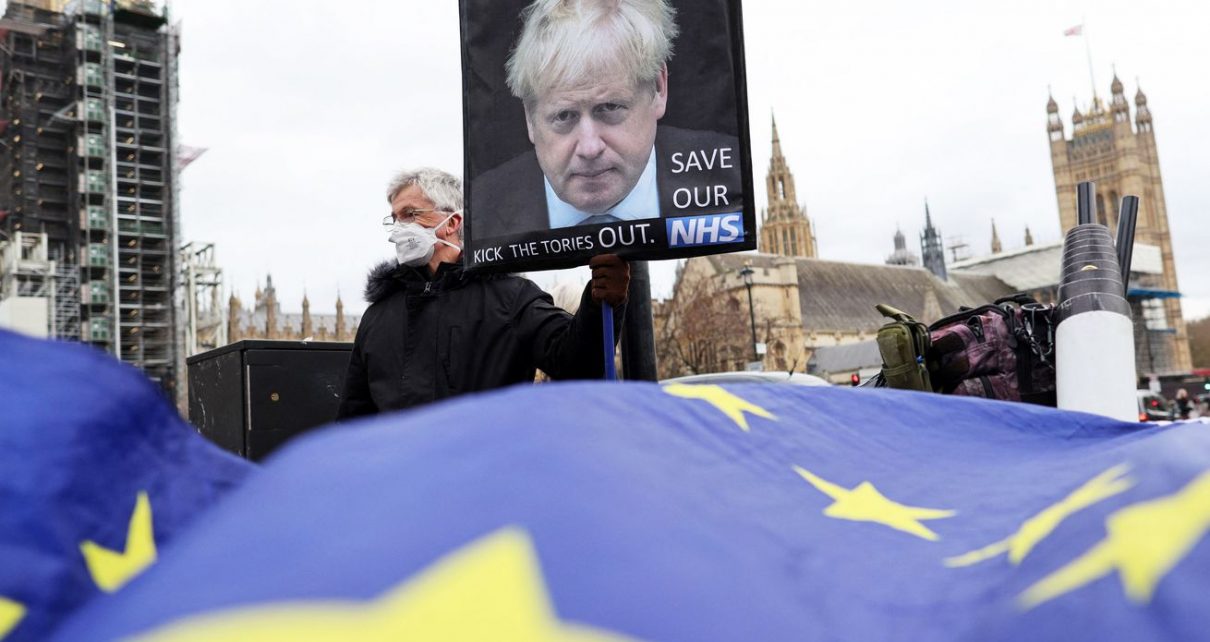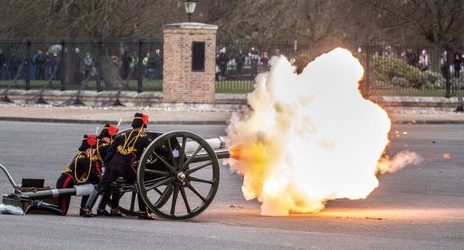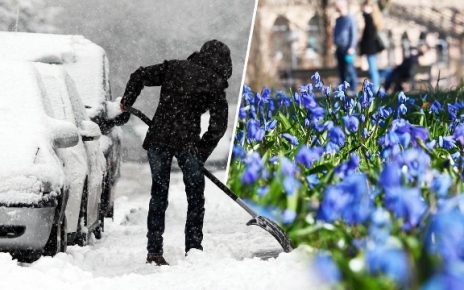
The controversy is putting pressure on Prime Minister Boris Johnson — and now he’s facing a Conservative rebellion.
Prime Minister Boris Johnson may have finally encountered a crisis that could seriously threaten his leadership. The crisis is a Christmas party.
Or an alleged Christmas party. In December 2020 — when a deadly coronavirus surge led to lockdowns so strict in parts of England that indoor meetings with people from other households were forbidden — a few dozen of the prime minister’s staffers reportedly hosted a festive gathering at 10 Downing Street. “Officials knocked back glasses of wine during a Christmas quiz and a Secret Santa while the rest of the country was forced to stay home,” the Daily Mirror claimed in a report in late November.
“Partygate” has only gotten messier since. Last week, iTV published a leaked video of Downing Street staffers laughing about the party, just a few days after the get-together supposedly took place. In a press conference dress rehearsal, now-former press secretary Allegra Stratton jokes with staffers that “this fictional party was a business meeting and it was not socially distanced.”
Then, over the weekend, the Sunday Mirror published photos that showed Johnson hosting a Zoom quiz on December 15, a few days before the party in question. Johnson was next to aides who were decked out in festive gear, and according to the report, staffers were still in the office, “huddled by computers, conferring on questions and knocking back fizz, wine and beer from a local Tesco Metro.” On Tuesday, the Daily Mirror followed up with a report that said emails showed staffers were planning to participate in the “virtual” quiz in the office; after the quiz wrapped up, one staff member instructed attendees in a message to “Go out the back.”
Johnson has denied that there were any parties, and he told the House of Commons last week that he was “repeatedly assured” that “no Covid rules have been broken.” (He’s since started to say that he broke no rules.) But since the initial Partygate reports, multiple allegations of illicit holiday gatherings hosted by those in or associated with the government have emerged. Right now, a top civil servant is investigating at least three events, including the shindig that sparked this whole thing.
That this possible party has exploded into a major political scandal is maybe not that surprising. On the day of the alleged Christmas party, more than 480 people in the United Kingdom died of Covid-19, with the country seeing the biggest peak of cases and deaths since the start of the pandemic. The UK’s Covid-19 regulations were extremely strict, and the British public’s compliance was pretty high. And that meant 2020 Christmas gatherings were canceled for many Brits — while, it turns out, government staffers may have flouted the very rules they imposed on everyone else.
Of course, plenty of politicians around the world have become embroiled in the “do as I say, not as I do” pandemic hypocrisy — including Johnson’s government even before this. But the drip-drip developments of “Partygate” are also coming as Johnson and his government are still dealing with the fallout from recent corruption scandals. Not to mention that Johnson’s government just moved to impose new Covid rules with the arrival of the omicron variant, just weeks before this Christmas.
That’s all building up at once, and it’s having real consequences for Johnson’s government. On Tuesday, about 100 Conservative members of Parliament (MPs) voted against Johnson’s efforts to require proof of Covid vaccination to enter certain venues. It was the worst rebellion Johnson has experienced as prime minister. The measures ultimately passed with support from the opposition parties, but for Johnson — who delivered that historic Conservative majority just two years ago — this is a newly precarious place to be.
Why “Partygate” became such a big deal
“A smaller Christmas is going to be a safer Christmas, and shorter Christmas is a safer Christmas,” Johnson told reporters on December 16, 2020. He initially included a carveout from England’s restrictions for the five days around Christmas, allowing up to three households to meet, but he urged people to be cautious and not to travel long distances.
A few days later, on December 19, Johnson said the situation had deteriorated so much that some areas — including London — had to go under “Tier 4” restrictions, the “Stay At Home” level. “Given the early evidence we have on this new variant of the virus, and the potential risk it poses, it is with a heavy heart that I must tell you we cannot continue with Christmas as planned,” Johnson said. The prime minister’s office said “the Christmas bubble policy” no longer applied to those in Tier 4, and for everyone else, up to three households could only gather on Christmas Day itself.
Amid all this, staffers at 10 Downing Street were allegedly knocking back booze and giving each other gifts, and then, according to the leaked video, laughing about it a few days later. According to the BBC, at least three members of the public who held or went to “unlawful gatherings” on December 18 — the same day of the alleged party — were fined by the courts. The hypocrisy has rankled Brits.
“Can we have a party this year?”
Boris: pic.twitter.com/CogrVMUMOG
— No Context Brits (@NoContextBrits) December 8, 2021
But “Partygate” might also be an outlet for other frustrations with Johnson’s government — the easy-to-understand misdeed that resonates in the way other scandals do not.
And Johnson and the Conservative Party have recently been mired in “sleaze” allegations, from questions about lucrative contracts the government made during the pandemic to a fine the Tories now face over a donation for a pricey renovation of the prime minister’s residence — which Johnson claimed he knew nothing about, until a recent report showed that, actually, he probably did.
“It’s very easy for people to draw contrasts with their own life. It’s not like a procurement scandal, where you quickly have to explain the rules officials should have followed before people’s eyes glaze over,” Christopher Hanretty, a professor of politics at Royal Holloway University of London, wrote in an email. “Most people have been to a Christmas party, and most people had to cut that stuff out last year. It’s a really clear case of public officials violating rules which were supposed to apply to everyone.”
Contrast the Downing Street get-together with another issue that Johnson’s government received criticism for: its handling of the case of Owen Paterson, an MP who was found to have received money to lobby the government on behalf of two companies. But it was really the handling of the case that created the controversy. Some of Paterson’s colleagues got behind a plan to pause Paterson’s punishment until they could overhaul ethics rules — a move Johnson himself backed. But those efforts got furious pushback from the public, and from many members of Parliament; Johnson’s government was forced to back away from the plan, and Paterson resigned.
Beyond these scandals, the pandemic itself is adding to the public’s turn against Johnson. Right now, Johnson is warning about a “huge spike” in coronavirus, driven by the omicron variant, and trying to put in place additional safety measures. The timing couldn’t be worse.
/cdn.vox-cdn.com/uploads/chorus_asset/file/23088004/AP21347547356738.jpg) Matt Dunham/AP
Matt Dunham/AP“We’re at a stage in the UK where we’re a little bit worried about the omicron variant, and people are beginning to worry about what it might mean — could Christmas be affected or something again?” said Alice Lilly, senior researcher at the Institute for Government, a nonpartisan think tank in the UK. “I suppose, then, for people to hear about allegations about what might or might not have been happening last Christmas in government — I think that just resonates probably a little bit more with people.”
The British public is not under the same level of restrictions as last year, but the fatigue and frustration are taking a toll. The pandemic, along with some of the aftereffects of Brexit, has hurt the UK economy, which is also seeing price increases and supply shortages. And now visions of boozing Downing Street staffers are dancing in voters’ heads. “In that context, the sorts of scandals that wouldn’t have touched Boris Johnson previously are having more purchase because I think voters are tired, and they’re not very happy,” said Will Jennings, a professor of political science and public policy at the University of Southampton.
It’s too early to be talking about Johnson’s downfall, but there are some warning signs
The big question about Partygate — though a terrible one for a pub quiz — is whether this is a temporary blip for Johnson or whether it reveals real electoral trouble. And if it does, what does that mean for Johnson’s leadership of the Conservative Party, and his standing as prime minister?
The first test for Johnson was Tuesday’s votes on Covid-19 “plan B” regulations, which included new face mask regulations, work-from-home rules, and “Covid certifications,” which are basically vaccine requirements to enter certain indoor public spaces, like nightclubs and concerts.
Conservative backbenchers (those MPs not in government) have previously bristled against Johnson’s restrictive Covid-19 measures, and Johnson has faced revolts from Conservative MPs in Parliament over some of these rules before. (It has echoes of some US Republicans’ rejection of things like mask and vaccine mandates.)
But Tuesday’s defeat is extraordinarily damaging because the revolt was enormous, with about 100 Conservative MPs defying the government on vaccine certifications. These kinds of uprisings aren’t supposed to happen.
“That’s not enough on its own to bring about the downfall of the government or anything like that,” Lilly said, before Tuesday’s vote. But, she added: “It’s definitely a warning sign.”
Another warning sign may reveal itself this Thursday. There is a by-election in North Shropshire, for the seat previously held by the now-disgraced Paterson. The seat is reliably Conservative; Paterson won in 2019 by more than 23,000 votes. But opponents have made sleaze and transparency a centerpiece of the campaign, and the Christmas party shenanigans add to that shadow. “A loss would indeed be disastrous, but even a narrow victory might still show Conservative MPs that they would fare better under an alternative leader,” Hanretty said.
/cdn.vox-cdn.com/uploads/chorus_asset/file/23088062/GettyImages_1357758028.jpg) Christopher Furlong/Getty Images
Christopher Furlong/Getty ImagesIt would be an astonishing development given that just two years ago, Johnson led the Conservatives to a dominating and transformative political victory, and until very recently, the Conservatives’ grip on the polls seemed impregnable. Labour and other opposition parties are trying to home in on the message that “it’s one rule for us, another rule for them,” a kind of populist sentiment against out-of-touch elites that also helped define Johnson’s brand of Brexit-y populism. “In some ways, Boris Johnson campaigned as a populist, won in the conservative leadership, and the general election as a populist against the liberal elite establishment blocking Brexit,” Jennings said. “Now [he is] having those guns and populism turned on himself.”
It is still too soon to know whether that rhetoric will stick long-term, but at least for now, Labour has overtaken the Conservatives in some recent polls, a remarkable turnaround and its biggest since 2014. There’s still a long way to go — Johnson’s come back from a few public defeats — but the cracks in his leadership are beginning to show. A lot of his support from his own party came from the perception that he was popular with the public. But if Johnson and the Conservatives still see support dropping into 2022 — long past Christmas party season — Johnson’s troubles may be much larger than last year’s parties at Downing Street.




